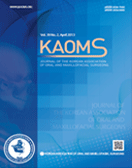Journal of the Korean Association of Oral and Maxillofacial Surgeons
- P-ISSN2234-7550
- E-ISSN2234-5930
- SCOPUS, KCI, ESCI
 ISSN : 2234-7550
ISSN : 2234-7550
Antibiotic sensitivity and resistance of bacteria from odontogenic maxillofacial abscesses
김문기 (국민건강보험공단 일산병원)
Abstract
Objectives: This study investigated the types and antibiotic sensitivity of bacteria in odontogenic abscesses. Materials and Methods: Pus specimens from 1,772 patients were collected from affected areas during incision and drainage, and bacterial cultures and antibiotic sensitivity tests were performed. The number of antibiotic-resistant bacteria was analyzed relative to the total number of bacteria that were tested for antibiotic susceptibility. Results: Bacterial cultures from 1,772 patients showed a total of 2,489 bacterial species, 2,101 gram-positive and 388 gram-negative. For penicillin G susceptibility tests, 2 out of 31 Staphylococcus aureus strains tested showed sensitivity and 29 showed resistance. For ampicillin susceptibility tests, all 11 S. aureus strains tested showed resistance. In ampicillin susceptibility tests, 46 out of 50 Klebsiella pneumoniae subsp. pneumoniae strains tested showed resistance. Conclusion: When treating odontogenic maxillofacial abscesses, it is appropriate to use antibiotics other than penicillin G and ampicillin as the first-line treatment.
- keywords
- Fascial space infection, Antibiotic resistance, Antibiotic sensitivity, Odontogenic infection
- 다운로드 수
- 조회수
- 0KCI 피인용수
- 0WOS 피인용수